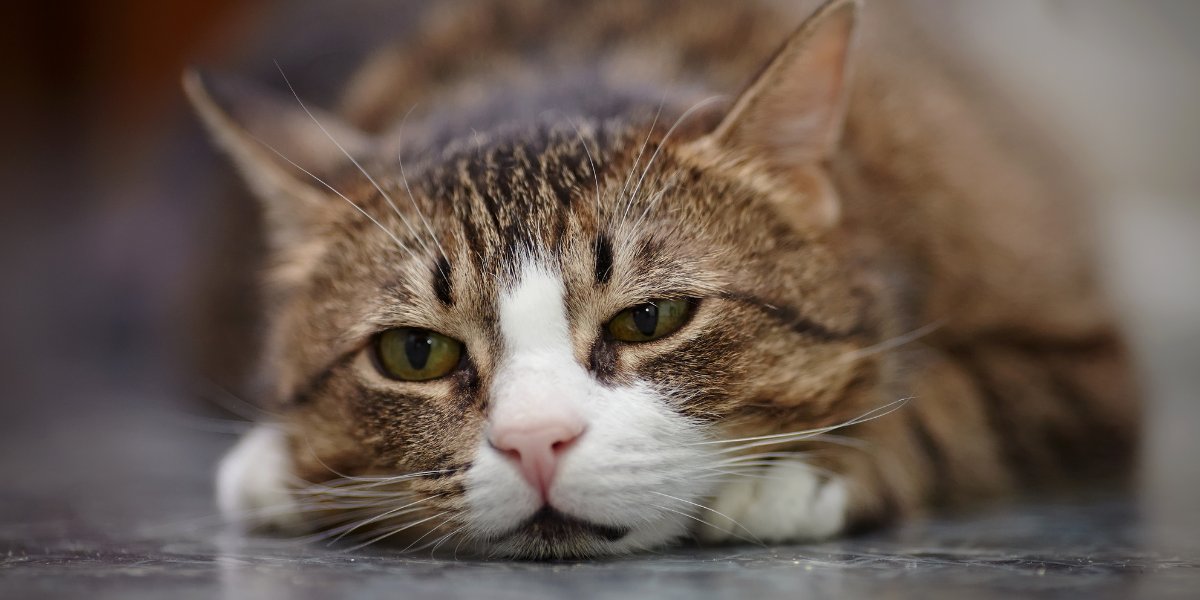
Have you ever wondered, “is my cat depressed”? It wasn’t long ago that people thought of animals as not having many feelings at all, but we now know that cats and other animals feel a wide range of emotions. Cats can feel happiness, excitement, and everything in between, including anxiety, sadness, and depression.
Can Cats Get Depressed?
When talking about emotions in animals, it’s a good idea not to anthropomorphize too much—after all, many emotions like depression are not exactly the same in cats as they are in people. Depression in cats is different from clinical depression in humans.
How To Tell if Your Cat Is Depressed
Depression in cats is sometimes a sign that the cat is experiencing something stressful and, as a result, displaying signs of depression. Some cats that are acting depressed might actually be sick rather than depressed.
If you suspect your cat is depressed, it’s important to do everything you can to get to the root of the problem and try to help your cat feel better.
Signs of Depression in Cats
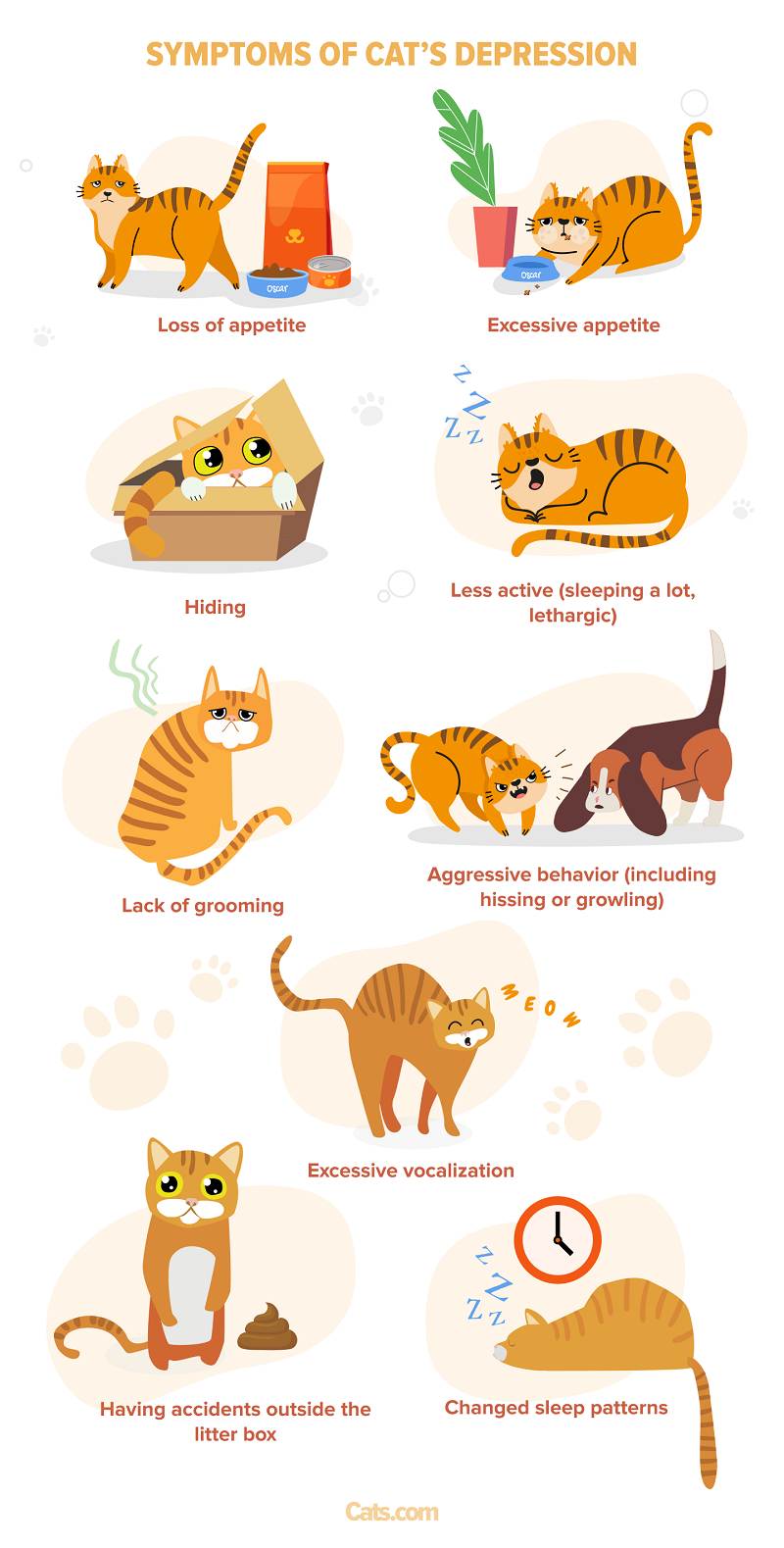
Now that you know cats can be depressed, you might be asking, “How do I know if my cat is depressed?”
Symptoms of depression in cats may include one or more of the following:
- Loss of appetite
- Excessive appetite
- Hiding
- Less active (sleeping a lot, lethargic)
- Lack of grooming
- Aggressive behavior (including hissing or growling)
- Excessive vocalization
- Having accidents outside the litter box
- Changed sleep patterns
Why Is My Cat Depressed?
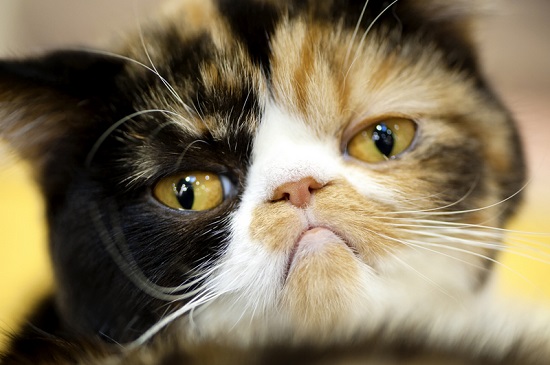
If your cat is acting depressed, it’s important to have her checked out by a veterinarian because symptoms of physical illness can often mimic depression.
Many times, a cat that is acting “depressed” is actually experiencing a medical condition that’s causing pain, nausea or some other type of discomfort. Because signs of depression are also signs of myriad health conditions and diseases, it’s absolutely vital that you have your cat examined by a veterinarian to rule out a medical cause for acting depressed.
If the reason for your cat’s depression is not medical, your vet can help you figure out what might be causing it. Many cats are very sensitive and can become easily stressed by changes in their environment, disruptions in their routine and changes in the family dynamic. Stress can lead to unusual cat behavior that mimics signs of depression.
Another reason some cats exhibit signs of depression is if they are under-stimulated and bored. Keeping cats indoors is recommended for their safety, but staying inside all the time can be boring for cats, which are designed by nature to hunt, pounce, scratch, climb and explore. Some cats that are no given enough opportunities to play, climb and exercise might start to become depressed.
Causes of Feline Depression
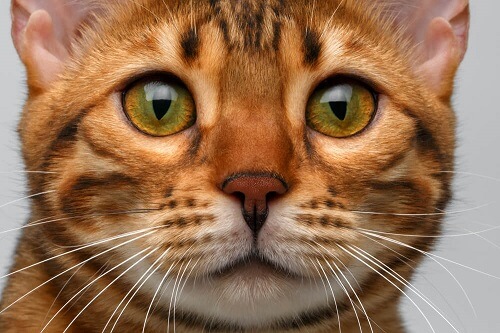
Cats can become depressed when they are feeling upset, anxious or fearful about something in their environment, such as major changes in the household, an addition of a baby, adopting new pets or workers in the home.
Almost anything could cause depression in cats, but some of the most common causes of a sad cat include:
- Health problems (illness, injury or disease)
- Bored or understimulated
- New baby in the family
- New pet in the family
- Family member moves out or in
- Death of human family member
- Cat depression after new kitten
- Death of other pet
- Moving to a new home
- Workers in the home
- Change in schedule/owner not home as much
How To Help a Depressed Cat
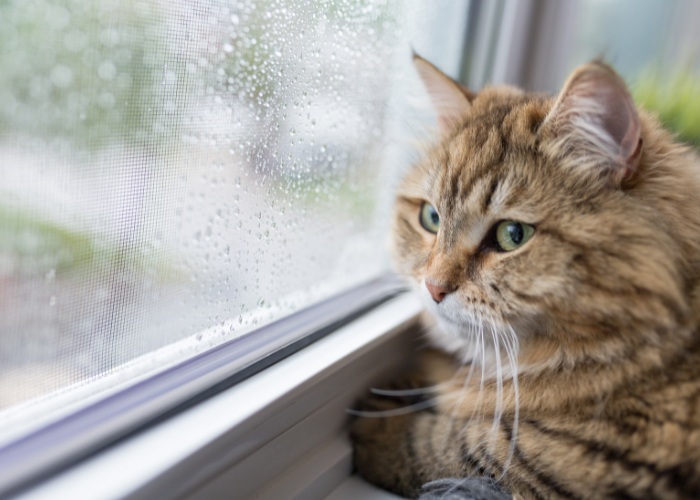
If your cat is acting down in the dumps, the very first thing to do is to bring him to the vet for a complete physical examination. If your cat gets a clean bill of health from the vet, it’s time to think about other reasons your cat might be experiencing stress, and as a result, signs of depression.
Some stressful things, like construction workers in the house, are transient. If your cat is upset about something in his environment that’s only temporary, do your best to help your cat find some peace and quiet, perhaps in a back room with soothing music playing to drown out sounds from the rest of the house.
If new humans or pets have recently joined the family, time is often all it takes for most cats to adjust to the new dynamic. You can help by using cat appeasing pheromones like Feliway, which are available as sprays, collars or plug-in diffusers, can help to calm cats. Giving all pets their own space, feeding separately and keeping enough litter boxes in the house (one per cat, plus one more), can also help.
Some cats get depressed and grieve when there is a death in the family, whether human or other pet. In such situations, treating your cats gently and lavishing your cat with extra attention can help get him thorough his grief.
Otherwise, try to determine what is upsetting your cat, and take some steps to improve the situation. But how do you cheer up a cat? Here are some ideas to help depressed cats:
1. Environmental Enrichment
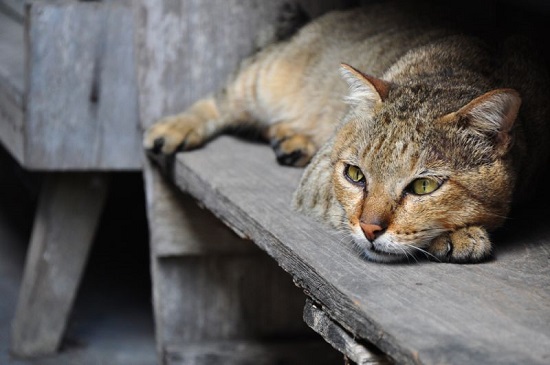
To help alleviate depression caused by boredom, upgrade your cat’s indoor experience by providing climbing trees or perches, placing cat scratchers in various parts of the house, and offering catnip or cat grass treats.
If your indoor cat needs more stimulation and exercise, there are plenty of steps you can take to enrich his environment. Environmental enrichment isn’t just for depressed cats—all cats can benefit from making their home more interesting and engaging.
If you don’t have them already, add multiple tall places for climbing and perching like cat trees or towers. Make sure your cat has plenty of approved scratching surfaces (both horizontal and vertical) and sprinkle a little catnip nearby to encourage your cat to visit and scratch.
Invest in some fun and interactive cat toys like feather wands, electronic toys to chase and swat, and a laser pointer (just don’t shine it in your cat’s eyes). Take 15 minutes twice a day to play with your cat to encourage exercise and engagement. Food dispensing toys can help your cat “work” for his food, simulating the hunting behavior of cats in the wild.
Also Read: Best Cat Toys: Keep Your Cat Fit and Happy With These Irresistible Toys
Finally, safely allow your cat to experience the stimulating sights, sounds and smells of the outdoors with an enclosure. This can be as ambitious as building a multi-leveled “catio” in your yard or as simple as buying a large wire dog crate to use on your patio or backyard.
2. Spend More Time With Your Cat
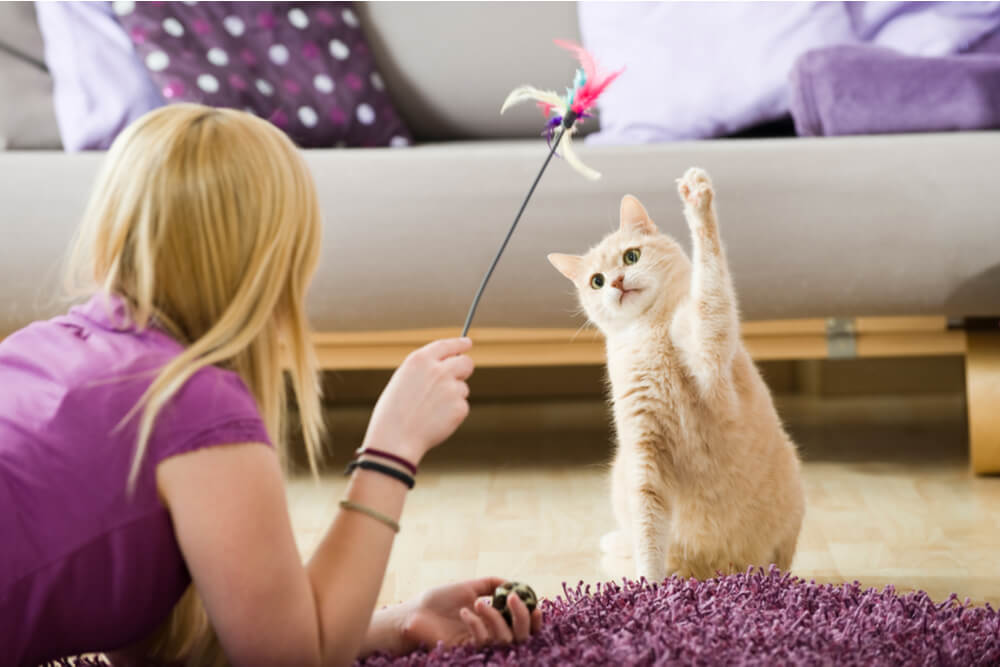
Daily activity and exercise, including play sessions with you, can go a long way to staving off seasonal depression in cats.
Even though cats might seem solitary, they do need attention and company to thrive. If you’re not home as often as you once were, or if your schedule has dramatically changed (for instance, from the day shift to the night shift), you cat might be feeling lonely. Try to spend some more quality time with your cat, doing things he likes, whether it’s cuddling on the couch, playing with favorite toys or brushing his coat.
Some cats might like the company of a friend, although be careful with this because some cats might become even more upset by the addition of a new cat or kitten. You know your cat best. If he is social and seems open to meeting other animals, consider adopting a new feline friend for company.
3. Consult an Expert
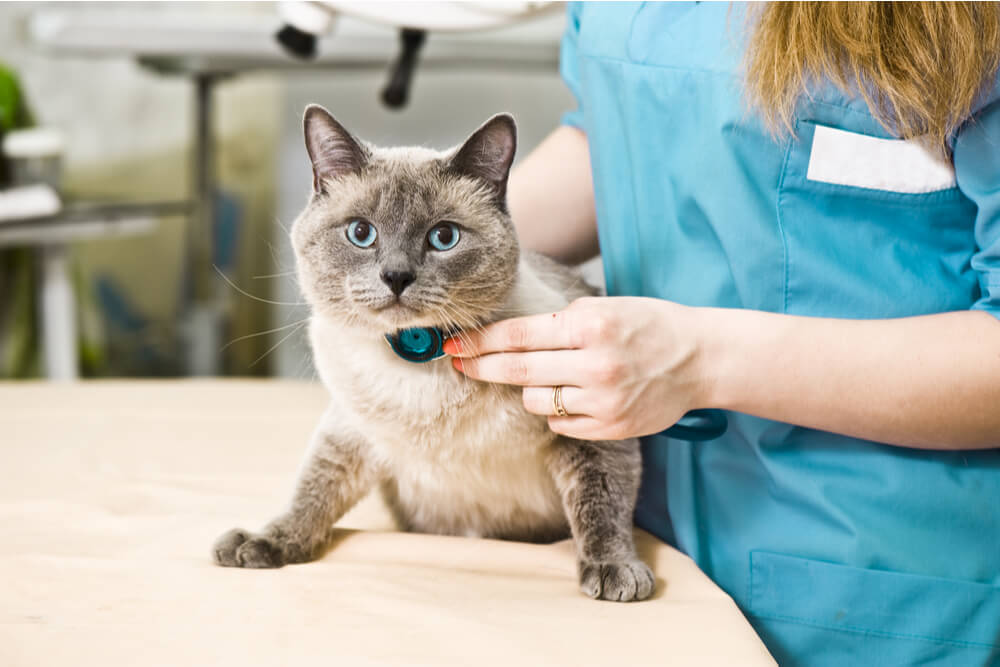
Your veterinarian or a veterinary behaviorist can treat your cat’s depression with medication if necessary.
If you can’t seem to get to the root of your cat’s depression, do not hesitate to reach out to an expert in animal behavior. Your veterinarian can provide a referral to either an animal behaviorist or veterinary behaviorist.
Animal behaviorists have a master’s degree or Ph.D. in animal behaviors. Board-certified veterinary behaviorists are veterinarians who have acquired extra training in animal behavior (look for Dipl. ACVB, which stands for diplomate of the American College of Veterinary Behaviorists, after their DVM title). Either expert can help identify the cause of your cat’s depression, and offer help to make him feel better.
Frequently Asked Questions
Can cats sense depression and anxiety?
Cats can feel happiness, excitement and everything in between, including anxiety, sadness and depression.
Do cats get depressed after abortion?
Some cats get depressed and grieve when there is a death in the family, whether human or other pet. It's also possible that some cats get depressed after abortion.
Do indoor cats get depressed?
Yes, both indoor and outdoor cats may suffer from depression.
Can cats get depressed after giving birth?
Yes, it's possible that a cat may suffer from depression (postnatal & postpartum depression)
Do cats get depressed when separated?
Yes, it is possible for cats to feel separation anxiety, cats are very attached to their owners and siblings.

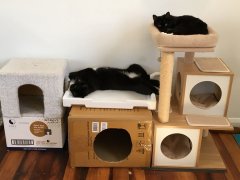



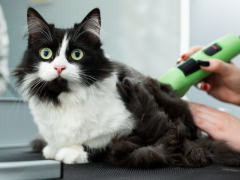

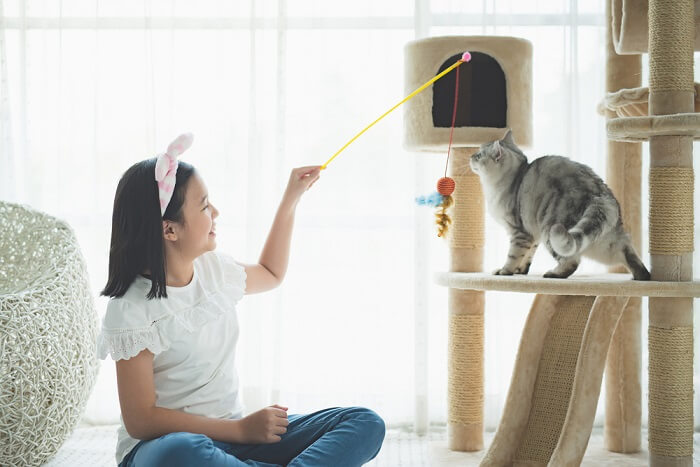
Hi, I have a 17yo Bengal. She is the love of my life. It was always just us and we always lived alone. 6yrs ago my mother passed and we moved 7 different times. She has been forced to be around other animals, and there is always someone e wanting my time when I get home and she is used to getting g my time. When we get up in the morning, and before bed. I’m trying g to get back on my feet as quickly as I can, bc I know this is probably the cause of her behavioral changes. She stays in bed all the time, and lays there with her eyes open. She is still eating well, but I’m afraid she has lost her spirit. I have a doggie cat. So smart, intuitive, sweet, always into something and so very loyal. I do t want to lose her. I’m fearful. I want her to bounce back. Please help.
It sounds like your Bengal has been through a lot of change and stress, which can deeply affect sensitive, bonded cats—especially in their senior years. You’re clearly very devoted to her, and while regaining routine and one-on-one time can help, you’re also welcome to ask for more personalized advice on the [Cats.com Behavior Forum](https://cats.com/community/c/behavior), where experienced cat lovers and experts can support you.
I moved 3 weeks ago to a different area with my 14 year old cat, he was used to going out on some grass/soil where my cat used to urinate/poo, I have outside space but it is paved, my cat uses a litter tray and is eating/drinking, he seems very unhappy and not really interested with playing with toys, I bought a Feliway plug in but at night when I am trying to sleep he just cries a lot, I am in rented accommodation so a bit limited in what I can do. We have moved quite a bit since I have had him but I have not seen this before, it upsets me as he paces the flat because he is restricted in what he can do. Any suggestions much appreciated.
Aww, poor kitty. Sounds like this new place has been hard for him. Any chance you could create some sort of garden space or sandbox for him? Maybe some potted catnip and cat grass in the yard would be nice for him. Does he have a cat tree he can climb? Something to climb up on might also be helpful.
Hello!
We had 3 cats, two a bit older, and one kitten who was part of a litter we brought up. When about 1,5 year old our “baby” still wanted to play a lot, but the older cats didn’t want to. We tried to give him enough time, but als thought it might be nice for him to get another kitten in the house to play with. We bought one, and he was overly excited. They loved each other from the start, and played a lot. Sadly, this kitten died with 14 weeks of an unexpected heart disease. All 3 of our cats we completely distressed for a while, so we bought another kitten, in the hope it would bring back some balance in the group.
Sadly enough, our “baby” and the new kitten are not playing at all together…for a while it was hard to give our second youngest enough time for cuddles and plays, mainly because our new kitten would steal it away from him.
Then he got sick…and had to be hospitalised. It happened during our holiday, so we weren’t around, and our cat sitters had to deal with it.
According to the vet he recovered from his illness, but now he is hiding a lot, very lethargic, and howling when we pick him up. Clinically (on the surface) nothing was found…
We’ve got our new kitten now for about half a year…do you think our “baby” could still be depressed, or overwhelmed after everything that has happened? He always has been a cuddly, but sensitive cat. (He also dislikes new people in the house, or gets scared of new noises). He’s still eating okay, and doing everything on the litter as he should, but he did lose some weight….
Hi Rolinke! I’m sorry your baby still isn’t feeling well, but it’s great that you’re concerned and want to help! It’s certainly possible that your cat is still experiencing some stress or anxiety. He went through a lot of big changes in a fairly short timeframe. Every cat’s personality is different and sometimes they just don’t get along, but since both kittens are fairly young you might be able to do some positive reinforcement to move the relationship in the right direction. Give them treats when they’re playing near each other or just napping. Try to play with them at the same time and give lots of treats so they learn to like it.
I’m actually not sure which kitten you’re referring to that got sick and is now depressed. Is it your “baby” or the new kitten? In either case, it might be worth talking to another vet for a second opinion. If they didn’t run blood tests or stool/urine tests, it might be worth a try in case something internal is going on. If he’s note experiencing stress, it could be that something is causing him pain. He may have also just calmed down a bit after transitioning into adulthood. Some cats simply aren’t fans of being touched without their consent.
Here’s a post about cats who aren’t affectionate that you might find helpful:
https://cats.com/why-isnt-my-cat-affectionate
I Have 2 cats which I have adopted. They are for all intents and purposes, healthy and happy but real picky about their food. I buy Purina one Hills or one of the premium wet or dry foods. and the girls often do the burying sign to express their displeasure. One of them actually tries to turn her bowl over. I hope she doesn’t learn how to throw the thing! Is this normal behavior?
Hi Paul, sorry about the late reply! It is normal for cats to cover their food if they’re unable to finish a meal in one sitting. Are you feeding them particularly large meals or leaving out a lot of food at once? Perhaps it would be a good idea to put out smaller meals that they can finish at once. As long as they appear to be happy and healthy and are eventually eating an appropriate amount of food each day, I see no reason to worry.
I have an old cat, I took a kitten shelter, my cat was offended by me and now does not want to live in my house. Constantly goes outside and remains there. What do I need to do?
Hello Max, that’s a difficult question! You may like our in-depth article on how to help cats get along: https://cats.com/how-to-help-cats-get-along
With the tips in this article, I think your older cat will gradually become accustomed to the new kitten and return to the home. Wishing you the best of luck! – Mallory